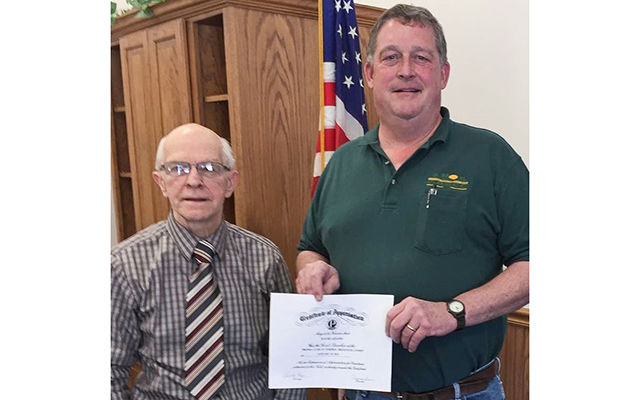
PRESQUE ISLE, Maine — The Presque Isle Probus Club held their regular monthly meeting on Jan. 18 at Northern Maine Community College’s Reed Commons.
Program director Dana Crory introduced the guest speaker, Dave Adams, owner of the Presque Isle family-owned business DASCO. The business began in 2001, originally known as Agriturf, based in Massachusetts. Adams worked for the company and then purchased it when it came up for sale.
The company spreads lime and dry liquid fertilizer, sprays crops (potatoes, broccoli, corn, grains and clear cuts), and also performs potato storage fumigation, soil sampling and testing, field mapping and refrigeration trucking. Their aim is to serve farm and forestry industries in all of New England.
The company provides material, mostly in the liquid state, to be spread or applied to farm fields. They provide required nutrient management plans for dairy farmers as well as fire ponds and private ponds.
When larger farms were able to plant over 340 acres a day, Adams purchased a Vector machine, capable of spreading lime on larger areas as soon as the soil is ready and within a narrow time frame when weather conditions warrant it. Lime is made from crushed limestone rock, magnesium and calcium, and acts as a soil-enriching substance.
Sometimes, contrary to popular belief and opinion, Adams said, the pesticides presently being used are not pollutants. The most dangerous pollutants are those containing phosphates of any kind.
The company briefly used a photomag photosynthesis accelerator program which force fed ( through airplane spraying), CO2 onto plants so that growth was more rapid. It proved to be very successful, but due to the decline in newsprint being made, the companies were not interested in continuing this route.
In the forest area, Adams explained, plantation release removes young striped maple and beech tree growth, to provide needed space for trees necessary for production, enabling clearer growth room.
Harmful insects are mostly brought into Maine by firewood that campers, sportsmen, etc. bring into the state, he added. All wood brought into Maine for production purposes is put through a quarantine process.
In other business, Janet Snow gave a reading from an article by Bob Eckstein on the historic and religious basis for the common snowman throughout the world, which has led to the whimsical snowman that we all build today. The largest snowman ever made was in Bethel and is in the Guinness Book of Records. It was 130 feet tall and named Olympia, after Congresswoman Olympia Snowe.
Anyone interested in learning more about Presque Isle, its organizations and businesses is welcome to attend a PROBUS meeting or become a member. The club provides scholarships to area students attending NMCC.







